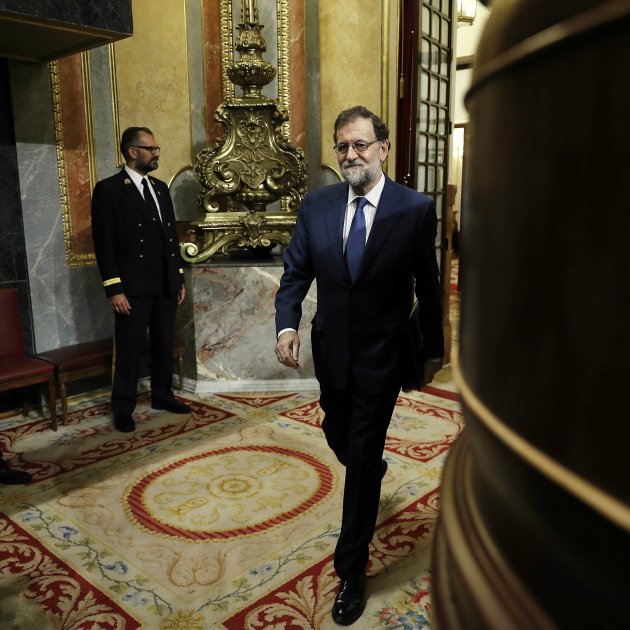The Spanish state is slowly moving to block off all the paths that would allow the referendum to be held in the ten days to go before 1st October. The Spanish government has this Friday subtly opened the way to charges of sedition for the demonstrations in Barcelona against the searches by the security forces. The spokesman of the central executive, Íñigo Méndez de Vigo, used the word "tumultuous" a number of times to describe the rallies during a press conference after today's cabinet meeting, echoing the language of article 544 of the Penal Code.
"They are accused of sedition those who, without being committed to the crime of rebellion, rise up publicly and tumultuously to prevent, by force or outside of legal paths, the application of the Laws or any authority, official corporation or public official from legitimately exercising their functions or fulfilling their agreements or administrative or judicial resolutions," reads the article. In terms of penalties, article 545 defines them as being eight to ten years in prison for the key participants and from ten to fifteen years if those key participants are in positions of authority. In both cases, moreover, a complete ban from public office of the same duration.
The word had also been used by the Spanish Interior minister, Juan Ignacio Zoido, in a letter sent to his Catalan equivalent, Joaquim Forn, in which he explained that, as a consequence of the "tumultuous demonstrations" in the streets of Barcelona, reinforcements from the state's security forces would be deployed in Catalonia. "It's for reinforcement and support as a judicial police for better coordination between the Catalan and central administrations", said the spokesperson, who denied that it was because the central government lacks faith in the Mossos d'Esquadra (Catalan police).
As a follow-up, journalists asked de Vigo if the executive had it in mind to ask for this kind of charge. The spokesperson replied that the decision doesn't fall to prime minister Mariano Rajoy, "but to the Public Prosecutors with their independence". The Attorney General, José Manuel Maza, gave an interview (in Spanish) to Spanish newspaper El Mundo on Sunday in which he had, in fact, been asked what charges might be contemplated, beyond those of misuse of public funds, disobedience and perversion of justice. He replied:
"There are more severe crimes if the jump to violence now takes places. We could be talking about crimes of sedition. That's on everyone's lips and it's a charge that so far is debatable, but unfortunately it's a possibility if, as the Penal Code says, violence or a tumultuous act takes place. If we see at any point that [sedition] is being committed, we won't hesitate. In that case, we believe that the competent court would be the National Audience," said Maza.
The shadow of the alleged crime could fall not only on the members of the public who jumped on Civil Guard vehicles, but even on the Catalan president himself, Carles Puigdemont, who could be accused of instigating the protests, or the heads of pro-independence organisations ANC (Catalan National Assembly) and Òmnium Cultural, Jordi Sànchez and Jordi Cuixart. On a related note, de Vigo had read a statement on Wednesday demanding that Puigdemont not use "demonstrations in the street" to get "the legitimacy he doesn't have".
In this context, the spokesman said that the publication of the polling stations for the referendum wasn't anything more than an "announcement", like other he believes the Catalan government has made, saying that it was "false" as there'll be no vote on 1st October. "There are no ballot boxes, there are no voting slips, there are no ballot cards, there are no polling stations, there are no inspectors or agents, there is no postal vote, nor list of people who have travelled abroad," said the minister. He added that a tweet, like the one Puigdemont sent with the link containing the polling stations, "would make [the Venice Commission] smile" as a "guarantee".
Finally, de Vigo reported that some schools have been shut, allegedly to take the pupils to the demonstrations. "I have to ask for respect. The task of teachers is not indoctrination. After the stories in the media, I asked the high inspection team this morning to start a report on the matter," said the spokesperson who is also the Education minister in the Spanish government.
